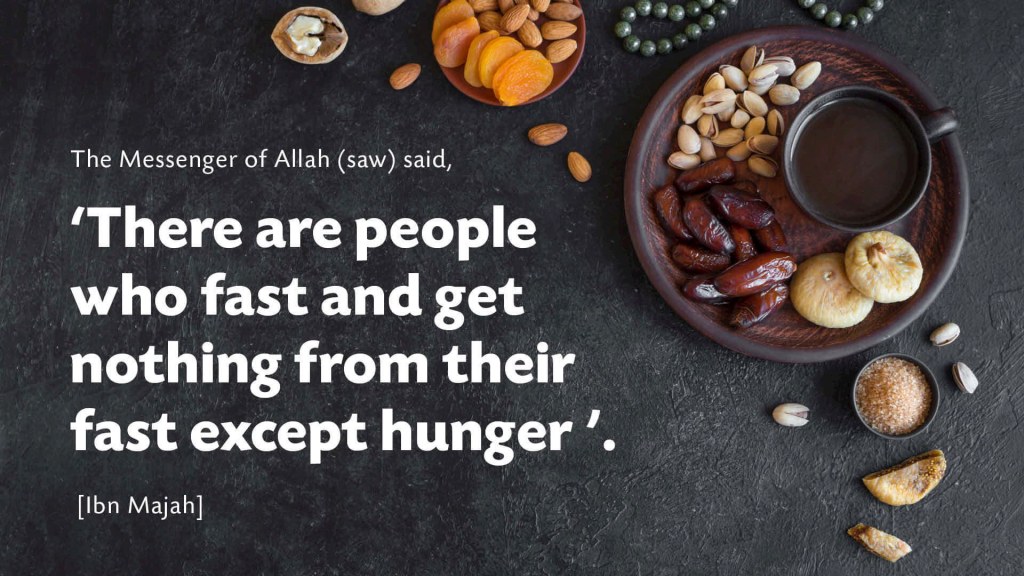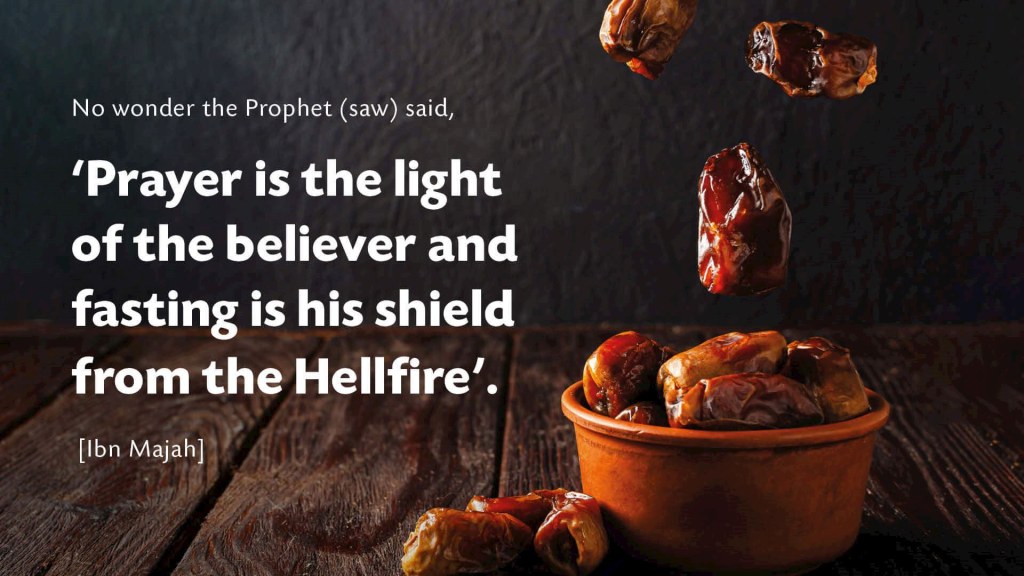Unlock Divine Blessings: Discover The Bountiful Rewards For Fasting In Ramadan!
Rewards for Fasting in Ramadan
Greeting to all Ramadhan enthusiasts and Ramadhan lovers! As we approach the holy month of Ramadan, it is essential to understand the rewards that await those who participate in fasting during this sacred period. Fasting in Ramadan is not only a religious obligation for Muslims but also a time of self-reflection, self-discipline, and spiritual growth. In this article, we will explore the rewards of fasting in Ramadan and the numerous benefits it brings to those who observe it.
What are the Rewards for Fasting in Ramadan?
3 Picture Gallery: Unlock Divine Blessings: Discover The Bountiful Rewards For Fasting In Ramadan!



📚 The rewards for fasting in Ramadan are abundant and are believed to be multiplied during this holy month. Muslims believe that fasting during Ramadan leads to the forgiveness of sins, increased spirituality, and a closer connection with Allah. It is a time of purification and reflection, where individuals strive to become better versions of themselves. The rewards for fasting in Ramadan are not only spiritual but also have physical and mental benefits.
Increased Spirituality

Image Source: muslimhands.org.uk
🕌 Fasting in Ramadan is an act of worship that helps individuals grow closer to Allah. It is a time of increased devotion and spiritual connection. Muslims believe that during this month, the gates of heaven are open, and the devils are locked away. It is an opportunity to focus on prayer, recitation of the Quran, and engaging in acts of kindness and charity.
Forgiveness of Sins
🙏 Fasting in Ramadan provides an opportunity for Muslims to seek forgiveness for their past sins. It is believed that sincere fasting and repentance during this month can lead to the forgiveness of sins committed in the past. It is a time to reflect on one’s actions, seek forgiveness from Allah, and strive to make positive changes in one’s life.
Reward of Paradise

Image Source: muslimhands.org.uk
🌴 Muslims believe that fasting in Ramadan is a means to attain paradise. It is mentioned in the Quran that those who fast with sincere intentions and devotion will be rewarded with eternal bliss in the hereafter. The rewards for fasting in Ramadan include a place in paradise, where believers will be granted everlasting happiness and peace.
Physical and Mental Benefits
💪 Fasting in Ramadan not only has spiritual rewards but also benefits the physical and mental well-being of individuals. When done correctly, fasting can improve digestion, boost metabolism, and promote weight loss. It also teaches self-discipline, willpower, and the ability to control one’s desires. Additionally, fasting has been found to have positive effects on mental health, promoting clarity of mind and increased focus.
Who Should Fast in Ramadan?

Image Source: muslimhands.org.uk
👥 Fasting in Ramadan is obligatory for all adult Muslims who are physically and mentally capable of doing so. It is a religious duty for Muslims who have reached the age of puberty and are in good health. However, there are exceptions for certain individuals, such as pregnant or breastfeeding women, menstruating women, travelers, and those who are ill. These individuals are exempt from fasting but are encouraged to make up for the missed fasts at a later time or provide compensation in other ways, such as feeding the poor.
When Does Ramadan Occur?
⌛ Ramadan is the ninth month of the Islamic lunar calendar, which is based on the cycle of the moon. The exact dates of Ramadan vary each year and depend on the sighting of the moon. Muslims worldwide eagerly await the sighting of the moon to determine the start of this blessed month. The duration of Ramadan is typically 29 or 30 days, during which Muslims fast from dawn until sunset.
Where is Ramadan Celebrated?
🌍 Ramadan is celebrated by Muslims all over the world. It is a global event that unites Muslims in their devotion, worship, and fasting. From the bustling streets of major cities to remote villages, Muslims come together to observe the rituals and teachings of Ramadan. Mosques and Islamic centers play a central role in promoting unity, community, and the spirit of Ramadan.
Why is Fasting Important in Ramadan?
❓ Fasting in Ramadan holds great significance in Islam. It is considered one of the five pillars of Islam, along with the declaration of faith, prayer, charity, and pilgrimage. Ramadan is a time of self-discipline, self-control, and self-reflection. Through fasting, Muslims learn empathy for the less fortunate, experience hunger and thirst, and develop gratitude for the blessings in their lives. It is a time to purify the body and soul, seek forgiveness, and strengthen one’s relationship with Allah.
How to Fast in Ramadan?
🌙 Fasting in Ramadan involves abstaining from food, drink, and other physical needs from dawn until sunset. The pre-dawn meal, called suhoor, is consumed before the start of the fasting period, while the fast is broken at sunset with a meal called iftar. Muslims also engage in additional acts of worship, such as voluntary prayers, recitation of the Quran, and acts of charity. It is essential to maintain a pure intention and observe the fasting guidelines prescribed in Islamic teachings.
Advantages and Disadvantages of Fasting in Ramadan
Advantages of Fasting in Ramadan
✅ Increased spirituality and closeness to Allah.
✅ Purification of the mind, body, and soul.
✅ Development of self-discipline and willpower.
✅ Physical benefits such as improved digestion and weight loss.
✅ Mental clarity and increased focus.
Disadvantages of Fasting in Ramadan
❌ Temporary feelings of hunger and thirst.
❌ Potential fatigue and decreased energy levels.
❌ Difficulty in maintaining productivity during fasting hours.
❌ Challenges in adjusting to the changed eating and sleeping patterns.
❌ Potential health risks for individuals with specific medical conditions.
Frequently Asked Questions (FAQs)
Q: Can I fast if I am traveling during Ramadan?
A: Travelers have the option to fast or not depending on their ability to do so. However, if fasting poses any difficulty during travel, it is permissible to break the fast and make up for the missed fast at a later time.
Q: Can children fast during Ramadan?
A: Children are not obligated to fast until they reach the age of puberty. However, many children begin observing partial or full fasts as a practice and preparation for adulthood.
Q: Are there any exemptions from fasting in Ramadan?
A: Yes, individuals who are ill, pregnant, breastfeeding, menstruating, or physically or mentally incapable of fasting are exempt from fasting. They can make up for the missed fasts at a later time or provide compensation through other means, such as feeding the poor.
Q: What should I do if I accidentally break my fast?
A: If a person accidentally breaks their fast by eating or drinking, they should immediately cease consumption and continue their fast for the remainder of the day. They can make up for the broken fast by fasting an additional day at a later time.
Q: How can I make the most out of Ramadan?
A: To make the most out of Ramadan, focus on acts of worship such as prayer, recitation of the Quran, and acts of charity. Strive to improve oneself and develop good habits that can be carried forward beyond Ramadan. Engage in self-reflection, seek forgiveness, and strengthen one’s relationship with Allah.
Conclusion
In conclusion, fasting in Ramadan is a highly rewarding and spiritually enriching experience for Muslims. It offers numerous benefits, including increased spirituality, forgiveness of sins, and the opportunity to attain paradise. Fasting in Ramadan is also beneficial for physical and mental well-being. Despite its challenges, the rewards and blessings associated with fasting in Ramadan make it a cherished and eagerly awaited time for Muslims worldwide. As the holy month approaches, let us embrace the rewards of fasting in Ramadan and strive to make the most out of this blessed time.
Disclaimer: The information provided in this article is for general informational purposes only and should not be construed as religious or medical advice. Consult with a qualified religious scholar or medical professional for specific guidance related to fasting in Ramadan.
This post topic: Ramadhan



